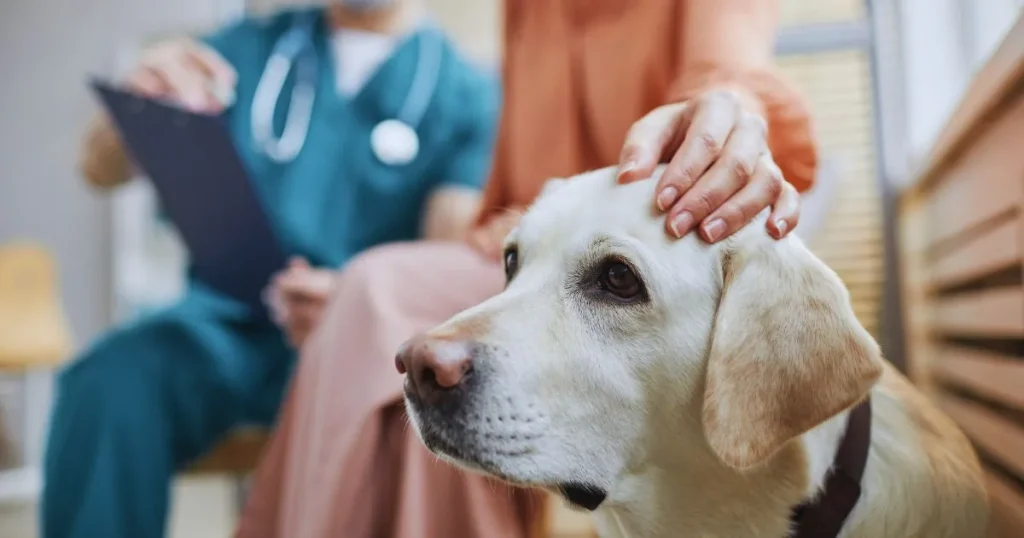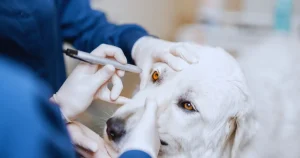Dog Eye Allergies: Causes, Symptoms and Effective Treatments

Eye allergies in dogs are a common problem that can make our furry friends uncomfortable. Allergies usually show symptoms related to skin issues or the digestive tract, but allergies may cause eye irritation in dogs.
Addressing eye allergies in dogs is important to consult with your vet to ensure appropriate treatment, reducing the risk of other diseases. In this article learn to recognize what dog’s eye allergies are, causes, and symptoms, and how to treat them to maintain your dog’s well-being.
What are Dog Eye Allergies?
Dogs can get allergy conjunctivitis, which means that things that bother them can hurt their eyes. For some, mold spores, plant pollen, small dust particles, and even pet hair can be very annoying. Some dogs get sick and sad when these things are near them. Most of the time, a dog with these signs will have red, itchy eyes that tear up a lot. Dog owners need to pay attention to these signs right away. They can quickly fix problems affecting their well-being and keep them from worsening. People who have had certain illnesses or eye problems for a long time may feel better when they have pets. Itchy eyes in your dog? Your vet can help your pet get better and tell you where the allergens are coming from.
Common Causes of Dog Eye Allergies
Like humans, dogs can develop allergies at any point in their lives, even if they have never experienced any issues before. Some of the most common causes of eye allergies in dogs:
Tress and Grass Pollen:
Similarly to people, pollen from trees, plants, and even some types of flowers can make dogs allergic. If your dog allergic to these things, their eyes may itch and redden. It’s possible that this disease is really hurting dogs because they are constantly scratching, rubbing their faces, and having red eyes. Knowing these signs will help pet owners get their animals the care and help they need. Worse signs, like swollen eyes or crying too much, may show up if the allergic reaction gets worse.
Food Allergies:
Some of the things that are in some dog food might make their eyes sick. They might get red, itchy, or runny eyes, among other things, when they have these allergic reactions. Some of these are burning in different parts of the body all the time, stomach problems like throwing up or diarrhea, and skin issues like rashes or hot spots. Find the bad food ingredient and take it out of the dog’s diet so these signs go away and the dog’s health gets better in general.
Irritants:
Dogs may become sick from everyday things like cigarettes, strong perfume smells, and rough house cleaners. When dogs respond, they often have eye pain, that shows up as red eyes and more tears than normal. It’s possible that these aren’t the only issues dogs have. They might sneeze more and scratch all the time too. As much as possible, dog owners should keep their dogs away from these things because they are bad for their dogs’ health and comfort.
Medications:
Dogs can have eye problems after taking particular medications. Your dog may get itchy, red, or watery eyes if it has these triggers. Always observe carefully how your dog responds to new medicines. Consult with your vet right away if you experience any of these or other negative effects. If you want to make assured your dog is healthy and happy, replacing the medicine or the amount could be the ideal thing to do.
Certain Fabrics and Materials:
Certain substances used to make beds, toys, and even your dog’s collar can make them allergic. You might not even know this. These things can make dogs’ eyes itch from allergies. Dogs may feel pain if their eyes are red, itchy, and wet. Pick relaxed pet supplies to avoid these problems as much as possible and make the house safer for everyone. Making these hypoallergenic things aims to lower the chance of getting allergies. Dogs and their owners both feel better and stay healthy in homes with them.
Symptoms of Dog Eye Allergies
Identifying dog eye allergies can be easy if you know what symptoms to look out for. Dogs with eye allergies can have a range of symptoms, from mild to severe. The following are some common symptoms you might notice:
- Itching, Redness,
- Watery eyes
- Eye scratching or rubbing
- Swelling around the affected eyes
- Discomfort and eye irritation
- Excessive Squinting
How Do Vets Diagnose Eye Allergies in Dogs?

A veterinary will utilize a comprehensive approach to diagnose dog eye allergies. Several quick tests to rule out some similar symptoms like eye infection, dry eye, or corneal ulcers. The vet also considers other vital information such as your dog’s age, breed, and history of itchy skin.
To identify eye allergies in dogs, veterinarians use various procedures such as eye staining to identify corneal ulcers, a Schirmer tear test to measure tear production, and tonometry to check eye pressure for glaucoma. If they suspect any illness, they may also carry out bacterial or viral cultures to confirm the diagnosis. Regular monitoring is important to ensure treatment effectiveness. If initial therapies fail, referral to a veterinary ophthalmologist may be necessary for specialized care.
Home Remedies For Dog Allergies
Discover natural home remedies that offer relief from irritation, inflammation, and discomfort. Some effective ways to alleviate your dog’s eye allergies
Saline Solution:
Saline can help get rid of things that are making your dog’s eyes hurt. It might assist them in staying fit and healthy. An antibacterial saline solution, like the kind used for contact lenses, is needed to keep things safe and stop the spread of germs. You only need to slightly pull down on your dog’s lower eyelid to make room for it. Next, drop a few drops of the saltwater solution carefully into the eye. This way of cleaning the eye breaks down and gets rid of any irritating foreign items. There is no need to worry about hurting or stressing your dog when you do the same thing more than once.
Warm Compress:
A warm compress can effectively soothe your dog’s eye allergies. Use a clean cloth soaked in warm water and apply gentle warmth over the affected eyes for several minutes to offer instant relief of discomfort and inflammation.

Herbal Eye Wash:
Allergies can be treated naturally with herbal eyewashes that contain soothing ingredients like chamomile, calendula, or eyebright. These herbal medicines are anti-inflammatory and antiseptic, relieve symptoms, and improve eye health.
Food Variations:
Dietary omega-3 fatty acids and antioxidants in your dog’s diet will go a long way in improving their immune system and reducing the severity of allergic reactions. Consult your veterinarian to identify the best nutritional supplements and special pet foods to reduce eye allergies in dogs.
Environmental Modifications:
Providing an allergen-free environment for your dog is important to reduce the incidence of eye allergies. Vacuuming upholstery and carpets regularly, using air purifiers, and limiting outdoor pollen exposure during peak seasons can all help reduce the severity of allergies and create a healthier living environment for your pet.
How to Treat Canine Eye Allergies

In treating eye allergies, it is important to first identify the underlying cause and the severity of the symptoms. These are a few steps to follow:
1. Find and Eliminate Allergen:
After figuring out where the allergen is coming from and working hard to get rid of it, you can start treating dogs with eye allergies. Dog with these allergies may have worsening symptoms if they breathe in pollen, spores of mold, dust mites that hide in clothes, or some ingredients in pet food. Whatever the issue is, you must keep your dog away from it. More frequent cleaning, air filters to get rid of indoor pollutants, or moving your pet’s bed can help you stay away from areas in which allergens tend to gather. Most likely, these things will help your dog feel better and live a longer, happy life.
2. Dietary Changes:
Some dog foods cause long-term eye allergies. Because of this surprising link, you should talk to a trained vet about your pet’s diet to determine if it’s causing their allergic reactions. Your vet can check if your pet has food allergies or issues. If tests show that your dog is allergic to certain foods, you should change what they eat. Everything could change with a special dog food. Diets without allergens can help.
This change in food eases your pet’s pain immediately and improves their life. If your dog’s allergies get better, he or she might be happy and healthier. This change will help your pet live a healthy, happy life without short-term or long-term allergic reactions. This proactive diet management method stresses finding out what causes your dog’s allergies and fixing them so that your dog stays healthy and happy.
3. Oral Medications:
Veterinarians may give your pet antihistamines or drugs to swallow if it has allergies that don’t go away. Because they stop the allergic reaction and make your pet no longer hurt or red, these medicines were made with a lot of thought. Chemical like histamine that causes allergies in the body. It’s better for people with allergies when steroids help their immune systems react less strongly to allergens. But it is very important that these medicines are only given by a doctor nearby. Making sure your pet stays safe and healthy while giving them steroids or antihistamines is very important.
4. Consultation with a Veterinarian:
Seeking professional help in dog eye allergy treatment is primarily from a veterinarian. They can accurately identify allergies and provide a treatment plan that is tailored to your dog’s specific needs.
Prevent Tips
While it’s challenging to completely prevent dog eye allergies, there are steps you can take to reduce your furry friend’s chances of getting them. Here are some preventative tips:
1. Regular Grooming: Maintaining your dog’s cleaning schedule will help keep theie eyes healthy. Regular baths and brushing of their fur will keep allergens out of their hair and out of their eyes. The skin around their eyes needs extra care. For pollen, dust, and dirt to be removed from their eyes, gently wipe them with a soft, wet cloth. Because the skin around your eyes is so thin and easily hurt, this step is very important. Dogs that are clean are healthier and happier, and they look better too.
2. Allergen Identification and Avoidance: Identifying specific allergens that trigger your dog’s reactions enables you to take proactive measures to avoid exposure. Keep a record of potential allergens and minimize contact whenever possible, whether it’s certain foods, plants, or environmental factors.
3. Proper Nutrition: Providing a balanced diet rich in essential nutrients and free from common allergens can support your dog’s overall health and immune function. Opt for high-quality pet foods tailored to your dog’s specific dietary needs and consult with a veterinarian for personalized nutrition recommendations.
FAQ:
How do I treat my dog’s eye allergies?
Eye drop antihistamines, such as Jaditor, may be prescribed to relieve eye irritation and redness. Also, reduce allergy exposure, apply recommended eye drops, change food as needed, and consult a veterinarian for personalized recommendations.
How can I alleviate my dog’s eye allergy at home?
To treat your dog’s eye allergies, use a simple saline solution to clean their eyes and surrounding area. You can purchase this from a veterinary pharmacy or make it yourself by mixing a teaspoon of salt and a cup of warm water.
How long does a canine eye allergy last?
Allergic symptoms in dogs’ eyes can last as a result of continued allergen exposure. If caused by a virus, recovery time can be around 3 weeks. In this case, it is critical to consult your veterinarian for an accurate diagnosis and treatment.
What medicine can I give my dog for eye allergies?
For bacterial eye infections in dogs, antibiotics are usually prescribed and antifungal medications are recommended for fungal eye infections. Always consult a veterinarian for proper diagnosis and medication recommendations for your dog’s health needs.
Is it safe to apply human eye drops on my dog?
Over-the-counter (OTC) human eye drops should not be used on dogs without veterinary approval. Since dogs’ eyes have different pH levels and sensitivities, most human eye drops may not work well for them. To avoid complications, see a vet about dog-specific eye therapy.
Eye allergies in dogs cause discomfort and anxiety, so it’s important to take home remedies and preventative measures to improve your pet’s eye health and quality of life. Identifying and minimizing exposure to allergens along with proper veterinary care is critical to the effective management of allergic reactions. Additionally, ensuring a clean environment and regular monitoring can help improve your dog’s eye health in the long run.






Ahaa, its good discussion about this post here at this
blog, I have read all that, so at this time me also commenting here.